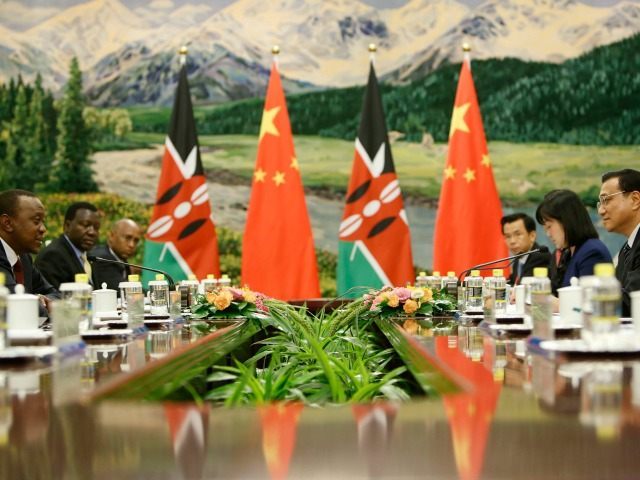Despite investing billions into turning Africa into a friendly business environment for them, a recent poll found that Kenyans perceive China as “the biggest threat to the country’s economic and political development.”
According to a new survey of Kenyans nationally released by Ipsos, 17 percent of Kenyans see China has a “hindrance to growth,” the largest percentage agreeing on what the biggest obstacle is lying between Kenyans and full development. Kenya’s The Standard notes that the United States is second with 15 percent. The Standard notes that most Kenyans – two-thirds – do not view non-African countries as threats, but China appears to inspire the most concern among those who do.
Kenyans also appear to significantly prefer doing business with the United States than with China, despite expressing some concern regarding trade with America. The majority of Kenyans, 41 percent, said they preferred to see their government strengthen ties with the United States, while only 16 percent supported enhanced relations with China.
The Standard notes that China is Kenya’s second largest trading partner and has invested billions in infrastructure projects in the country.
China has invested billions all over the African continent in developing closer trade relations. Chinese propaganda efforts also credit the Asian powerhouse with working to improve African economies, though a majority in Kenya appear uncomfortable with that assertion. “In 2015 China-Africa relations did go up and that demonstrated trust and mutual benefit,” according to South African research specialist Yazini April, adding that “China proved itself that it’s a dependable partner. When China promise to do this and that this year, they do it. China is not the World Bank or the U.S.”
South Africa’s government has arguably done the most to strengthen relations with China for economic benefit. “The countries that have been dealing with us before, particularly old economies, they’ve dealt with us as former subjects, as former colonial subjects,” President Jacob Zuma said in 2014, adding, “The Chinese don’t deal with us from that point of view. They deal with us as people that you must do business (with), at an equal level so to speak.”
China has benefitted from courting South Africa, as the nation has denied the Tibetan spiritual leader the Dalai Lama entry into the country on multiple occasions. The Chinese government has threatened to stymie relations with South Africa should the Dalai Lama visit. “He (the Dalai Lama) can’t just come and spoil this for you and we want a friendly atmosphere and environment for this to happen. We invest a lot of money in South Africa and we can’t allow him to come and spoil the good relations,” African Affairs Department head Lin Songtian said this week.
The more dire an African nation’s situation, the more China appears to be striving to become a necessary part of its economy. At the height of the Ebola outbreak in west Africa, China donated over $5 million in medical supplies and health professionals to Liberia, Guinea, and Sierra Leone. While experts noted the sum as a pittance compared to the donations of other countries, the millions were a significant deviation from China’s typically frugal approach towards humanitarian aid.
In light of a growing refugee crisis in Kenya, China is also trying the humanitarian approach, donating thousands of tents for Somalis fleeing from jihadist violence in the neighboring country.
China has had better luck cementing a foothold in Zimbabwe, where 175 quadrillion of the local dollar is worth about $5. There, the dictatorship of Robert Mugabe has given up on the national currency entirely and begun trading in yuan. Zimbabwe’s finance minister announced a plan this month to encourage Chinese tourists to spend in yuan within the country, increasing the amount of yuan circulating in Zimbabwe until enough exists to sustain domestic trade. China is considering canceling millions in Zimbabwean debt in a larger deal that would result in the yuan becoming national currency. The Zimbabwean plan follows deals with South Africa and Kenya that allow for direct currency trade with the yuan, eliminating trade in U.S. dollars in between.
As yet another overture to Zimbabwe, the Chinese government awarded Mugabe the Confucius Peace Prize this year, a dubious distinction meant as a counterweight to the Nobel Peace Prize that counts among its recipients Cuban dictator Fidel Castro and the architect of the violent conquest of Crimea from Ukraine, Vladimir Putin.
Critics complain that China’s naked economic grabs in the continent are having a similar effect to decades of Western colonialism. Jane Goodall, the British conservationist, recently accused China of “merely doing what the colonialist did. They want raw materials for their economic growth, just as the colonialists were going into Africa and taking the natural resources, leaving people poorer.”

COMMENTS
Please let us know if you're having issues with commenting.